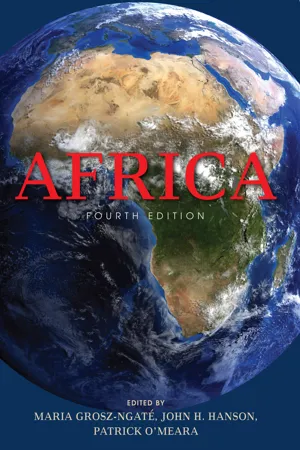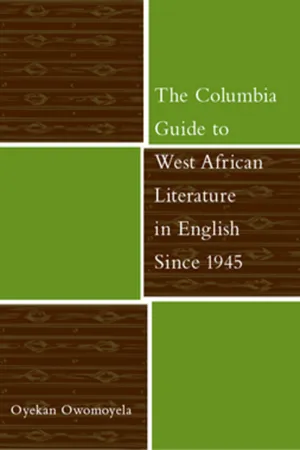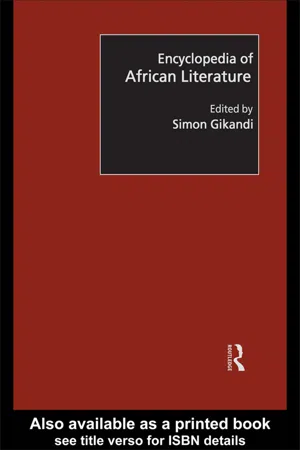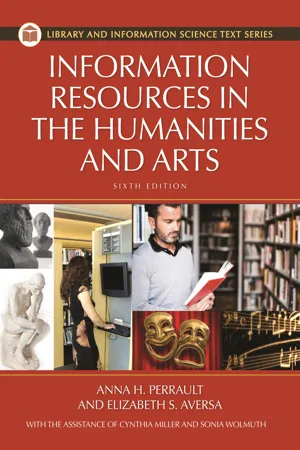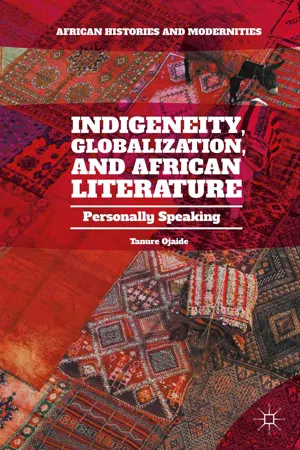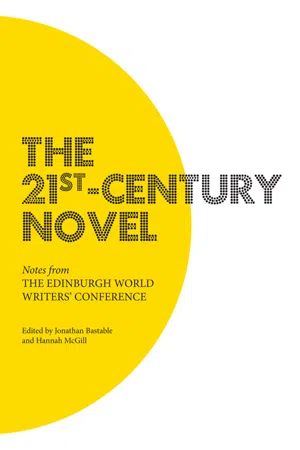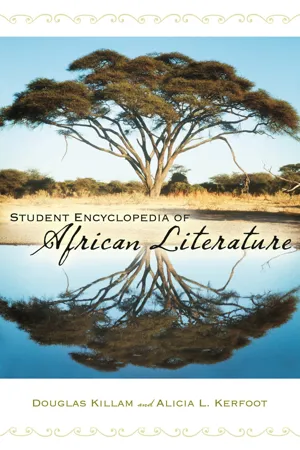Literature
African Literature
African literature encompasses the diverse literary works produced by writers from the African continent. It reflects the rich cultural, historical, and social experiences of the continent, often addressing themes such as colonialism, post-colonialism, identity, and the struggle for independence. African literature includes a wide range of genres, from novels and poetry to oral storytelling traditions, and has made significant contributions to world literature.
Written by Perlego with AI-assistance
Related key terms
1 of 5
7 Key excerpts on "African Literature"
- eBook - ePub
- Maria Grosz-Ngaté, John H. Hanson, Patrick O'Meara, Maria Grosz-Ngaté, John H. Hanson, Patrick O'Meara(Authors)
- 2014(Publication Date)
- Indiana University Press(Publisher)
10
Literature in Africa
Eileen Julien Truth depends not only on who listens but on who speaks.—BIRAGO DIOPWhen most Americans and Europeans use the expression “African Literature,” they are referring to the poetry, plays, and novels written by Africans that reach Western and Northern shores. These have typically been written in English, French, and, increasingly, Portuguese. If one takes the long or broad view, however, these contemporary works of international standing are but one segment of a vast array of word arts in Africa, which have a long, complex, and varied history.We have no record of the earliest oral traditions, but we know that verbal arts in Africa, oral and written, are ancient and long preceded the modern era, characterized by European colonialism and the introduction of European languages. African Literature can be said to include Egyptian texts from the second and third millennia BCE; the sixth-century Latin-language texts of Augustine of Hippo; texts produced in Ge’ez, the ancient language of the region that has become Ethiopia, such as those of the Axumite period (fourth to seventh centuries); and Arabic-language texts, such as those of fourteenth-century North Africa, seventeenth-century Timbuktu in the western Sahel, and the nineteenth-century eastern coast of Africa. And alongside the widely known contemporary traditions in imported but now Africanized languages and forms, there is ongoing written and oral production in indigenous languages such as Amharic, Kiswahili, Pulaar, Yoruba, and Zulu. Moreover, many bards, storytellers, poets, and writers in these languages have embraced contemporary genres and new media. This vast contemporary production of African-language literature and “orature” (oral traditions) is largely unknown and ignored by those outside the continent. Inside Africa, these oral and more accessible popular texts may be the best-known and most-appreciated literary forms. - Oyekan Owomoyela(Author)
- 2008(Publication Date)
- Columbia University Press(Publisher)
It is a question that has dogged the literature since it began to attract worldwide attention in the early 1960s, and to which no satisfactory answer has emerged. It is the subject of intense debate between, on one side, so-called cultural nationalists (sometimes also dismissed as “nativists”) who insist that by definition African Literature must be literature in African languages, and on the other, (supposed) progressives and internationalists, who hold tenaciously to the notion Baker mentioned, and for whom insistence on African languages reflects all the worst tendencies of ethnic particularism and identity politics. The terms of the discussion become more specific, but before considering them it is well to revisit the developments that resulted in the present state of affairs. Part 1. The Literary and Cultural Context of West African Literature in English • 39 The European colonizers who cobbled modern African countries together administered them during the colonial period for their own convenience and benefit, and in the process they trained a cadre among the colonized Africans to serve their colonizing purpose. The colonial governments encouraged the teaching of the colonial language at a very early stage in the education process in order to accelerate its acquisition by their colonial subjects, and thus to discourage their use of their mother tongues. French colonial policy enforced the sole use of French from the first days of schooling, while the British tolerated the use of the mother tongue for the first two years, after which instruction was mandated to be in Eng-lish exclusively. In instances where church missions, who operated the great majority of the schools, were inclined for their own reasons to opt for mother-tongue education, govern-ment subventions sufficed to win their compliance with official policy.- eBook - ePub
- Simon Gikandi(Author)
- 2003(Publication Date)
- Routledge(Publisher)
The African Experience in Literature and Ideology (1981), that African letters had a specific character that distinguished it from other literatures and thus demanded at least an adjustment of Western critical formulations. Irele’s powerful claim was that it was out of the oral tradition that Africans derived an image of themselves and their history as part of a collective consciousness.Such claims of distinctiveness needed, however, to contend with the diversity of African cultures and traditions themselves. Indeed, one of the reasons why the identity of African Literature became such a central issue in criticism was that it was not clear what the continent’s writers, whose identities and backgrounds ranged from the Islamic (seeIslam in African Literature) and Arabic traditions of North Africa to the colored writers of the Cape Province, had in common, except perhaps the experience of being colonized by Europeans. Earlier literary histories of African Literature like the ones by Jahn and Keesteloot had found a center of interests in the mythologies of black culture and negritude, but for the critics of the postcolonial period in the 1960s who were writing when these unifying mythologies were unraveling, criticism could not simply be founded on the myth of an African world promoted by the writers themselves. Still, the question of definition could not go away. It would reappear in different paradigms, especially in literary history. It would appear, for example, in attempts in the 1970s and 1990s to produce literary histories based on national or ethnic identities.The question of the identity of African Literature was, of course, overshadowed by the persistent and controversial question of language. The debate had started at the dawn of African independence with Obi Wali’s essay (1963: Transition), “The Dead End of African Literature,” in which the Nigerian critic argued that “the uncritical acceptance of English and French as the inevitable medium for educated African writing [was] misdirected, and [had] no chance of advancing African Literature and culture.” Wali was adamant in his claim that “any true African Literature must be written in African languages.” Wali’s position was opposed by many influential figures in African literary circles, including Mphahlele andChinua Achebe, - Anna H. Perrault Ph.D., Elizabeth S. Aversa, Sonia Ramirez Wohlmuth, Cynthia J. Miller, Cynthia F. Miller(Authors)
- 2012(Publication Date)
- Libraries Unlimited(Publisher)
This anthology of 30 African writers brings together fiction and non-fiction from the entire continent. The works included were originally pub- lished in other languages: Arabic, Zulu, and French, among others. Recurrent themes are politics, repression, and exile. 6-35 West African Literatures: Ways of Reading. Stephanie Newell. Oxford: Oxford University Press, 2006. 188 • 6—World Literature and Languages This collection of essays focuses on the literature of West Africa written both in English and French, as well as the native language oral traditions. The 14 chapters are organized thematically and deal with the oral tradition, issues of translation, post-colonialism, and nationalism and identity. Africa—Narrative 6-36 The Cambridge Companion to the African Novel. Abiola Irele, ed. Cambridge, UK; New York: Cambridge University Press, 2009. Print and e-book. This overview of the African novel begins with a chronological orientation followed by discussion of the oral and written traditions. Subsequent chapters treat particular authors, the novel in Afrikaans, the novel in Francophone Africa, the autobiographical novel, and emerging themes such as the post- colonial condition. A complementary critical work is Contemporary Francophone African Writers and the Burden of Commitment (Odile Cazenave and Patricia Célérier. University of Virginia Press, 2011). This special- ized volume treats the historical and political issues that permeate literary production in Franco- phone Africa. 6-37 New Novels in African Literature Today: A Review. Ernest N. Emenyonu, ed. Ibadan, Nige- ria: HEBN; Woodbridge, UK; Rochester, NY: James Currey, 2010. (African Literature Today). The essays in this concise guide offer an overview of the most recent narratives of African writers including African writers who now reside elsewhere.- eBook - PDF
Indigeneity, Globalization, and African Literature
Personally Speaking
- Tanure Ojaide(Author)
- 2015(Publication Date)
- Palgrave Macmillan(Publisher)
An African writer needs to project Africanity to remain an identifiable personality in a world of many cultures despite claims of cosmopolitanism or globalism. One can be African and share with others the African as others should share their cultural contributions with the rest of the world. We will be stupid if we continue ceding our values to others who do not cede any part of theirs to us. In conclusion, I repeat what I said in an earlier book, Contemporary African Literature: New Approaches : It goes without saying that since literature is a cultural production and is dynamic like the culture that carries it, the notion of an African literary canon is fluid and not cast in stone. The canon is not calcified, but evolving within the shared experiences of Africans, rooted in their known reality, and forever tapping into their changing consciousness. However, despite the diversity and the expanding content and style of modern African Literature arising from the dynamic experience of the people and continent, African Literature will remain that literature that responds to the concerns and expresses the sensibility and aspirations and ideals of African people in a form and manner that they see as part of their living reality. C H A P T E R 2 Contemporary Africa and the Politics in Literature Introduction Contemporary Africa conflates the literary works of three major generations of writers that include the first generation of Sembene Ousmane, Chinua Achebe, Christopher Okigbo, Wole Soyinka, Kofi Awoonor, Ngugi wa Thiongo, Ama Ata Aidoo, and J. P. Clark; the second generation comprising Niyi Osundare, Jack Mapanje, Nurudin Farar, Isidore Okpewho, Festus Iyayi, Femi Osofisan, Jack Mapanje, Frank Chipasula, Mandla Langa, and Tanure Ojaide; and the third generation consisting of Chimamanda Ngozi Adichie, Sefi Atta, Vonani Bila, and other younger writers. - eBook - PDF
The 21st-Century Novel
Notes from the Edinburgh World Writers' Conference
- Jonathan Bastable, Hannah McGill(Authors)
- 2019(Publication Date)
- EUP(Publisher)
… or indeed afric an, since afric a, it goes without saying, encompasses many nationalities and languages, but some of its great fiction was produced in europ ean languages. any discussion of the parameters of the language of afric an literature is already a transnational, multilingual undertaking. and as it happens, Alain Mabanckou , in the keynote he delivered in brazzaville, dwelt on this very question of language, literature and national A NATIONAL LITERATURE 268 (or supranational) allegiance – as if commenting on the passing remarks in habila’s speech. What follows is an abridged version of that address on the topic of afric an literature in french. ‘The question of a national literature is very political,’ said Mabanckou, ‘especially when we are discussing writers from sub-Saharan afric a. The question implies that we disapprove of writers who prefer what became official languages, those of colonisation. We imply that francophone congolese literature cannot be called national literature, because it is expressed in a language incapable of understanding some of the ‘codes’ of specific local realities. There is in this a kind of nostalgia for times past, mingled with a gregarious africanism which denies writers the possibility of hearing the din of the world, the chaos of mutations born out of what the great congolese writer Tchicaya Utam’si referred to as the ‘bronze civilisation’. The notion of a national literature is used to confine spirits – to demagogical ends. ‘This nationalistic and very afro-centred movement is now widespread among french black afric an elite writers. for them, a national literature represents the reconquering of an identity, a return to the source, a rejection of western domination. It is, in a word, a call for a real afric an conscience, since what makes up what we would call afric an literature – written by afric ans for afric ans – is the sum of the continent’s national literatures. - eBook - PDF
- Douglas Killam, Alicia L. Kerfoot(Authors)
- 2007(Publication Date)
- Greenwood(Publisher)
European scholars such as Ruth Finnegan maintain that African oral literature can be studied in a literary rather than an anthropologi- cal framework, while African critics like Isidore Okpewho dispute the way that such literature is typically seen through European terms that relate to Classical literary history. A large number of critics, some of whom are Daniel P. Kunene, Richard Taylor, Karin Barber, and Elizabeth Gunner, stress the need to study oral literature alongside writ- ten literature without giving precedence to written literature. The connection between the written and the oral in the Yoruba cul- ture of Nigeria is studied by Karin Barber, while Isabel Hofmeyr and others maintain that oral and written forms are interwoven in cohesive social contexts. These kinds of studies draw attention to the need to avoid relegating oral culture to the past and dis- connecting it from written forms in African societies. These critics also draw attention to the importance of avoiding the assump- tion that the written word is a higher literary form than the spoken word. Literary theory continues to be a difficult place of navigation in terms of its effect on African cultural and literary analysis, be- cause of its association with repressive West- ern and colonial frameworks. As Biodun Jeyifo argues, literary theory can be viewed as a form of Western suppression of Afri- can cultures. In this sense it is important to ground theory in African cultural contexts Literary Theory 181 while still taking into account their reaction to and connectedness with colonial forms. As is noted by Barbara Christian and Gerald Gaylard, African writers’ use of narration and interaction with language rather than typical theoretical forms requires attention as well. Thus, a balance between critical theory and African cultural forms of resistance requires attentive negotiation in the theoretical analy- sis of African Literature.
Index pages curate the most relevant extracts from our library of academic textbooks. They’ve been created using an in-house natural language model (NLM), each adding context and meaning to key research topics.
